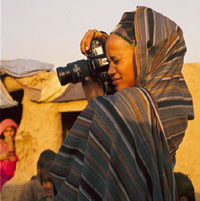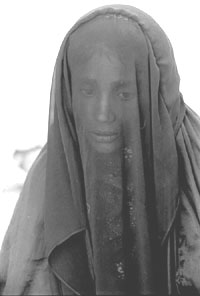
Johnette Stubbs

A Makrani girl stands in the southern Pakistani city of Gwadar. (Photo by Johnette Stubbs)
 Johnette Stubbs |
 A Makrani girl stands in the southern Pakistani city of Gwadar. (Photo by Johnette Stubbs) |
Stubbs recently returned from Pakistan, where she photographed women, men, and children from two of Pakistan's least visible communities: newly arrived Afghan refugees and Makranis, people of African descent who have been integrated into Pakistan during the last 500 years. During November and December she visited the regions around the northern cities of Islamabad and Quetta and the southern cities of Gwadar and Turbat. She photographed urban and rural populations.
Stubbs is focused on preserving, documenting, and developing cultural heritage. She speaks English, Spanish, Portuguese, German, French, and Fulani. She earned a B.A. in French and international studies from Spelman College in 1991 and subsequently joined the Peace Corps, where she taught and did HIV prevention in Cameroon, Africa. From 1996-2000, she directed a cultural exchange project (Project Destiny 2000) that traveled in South and Central America to document the work of local artists and musicians, and create workshops in music, dance, theatre, and papermaking. Stubbs has also lived in Brazil for extended periods of time. She has also taught at the Tisch School at New York University.
Her photographs have been exhibited in the U.S., Mexico, and Costa Rica. Her work has also been incorporated into children's books, multi-media films, and collages. Most recently her exhibits on the African Diaspora were displayed at MoCada Gallery in Brooklyn, N.Y., and La Pena Cultural Center in Berkeley, Calif.
This event is sponsored by History, Modern Foreign Languages and Literatures, Political Science, Curriculum II, Women's Studies, the Diversity Center, and the Center for Vocational Reflection at Gustavus. In addition to the public lecture, Stubbs will meet with Gustavus students to talk about how she found her vocation.
Gustavus Adolphus College is a private liberal arts college in St. Peter, Minn., that prepares 2,500 undergraduates for lives of leadership, service, and lifelong learning. The oldest Lutheran college in Minnesota, Gustavus was founded in 1862 by Swedish immigrants and named for Swedish King Gustav II Adolf. At Gustavus, students receive personal attention in small-sized classes and engage in collaborative research with their professors. Fully accredited and known for its strong science, writing, music, athletics, study-abroad, and service-learning programs, Gustavus hosts a chapter of Phi Beta Kappa and is internationally recognized for its annual Nobel Conference.
###
Digital photographs available upon request